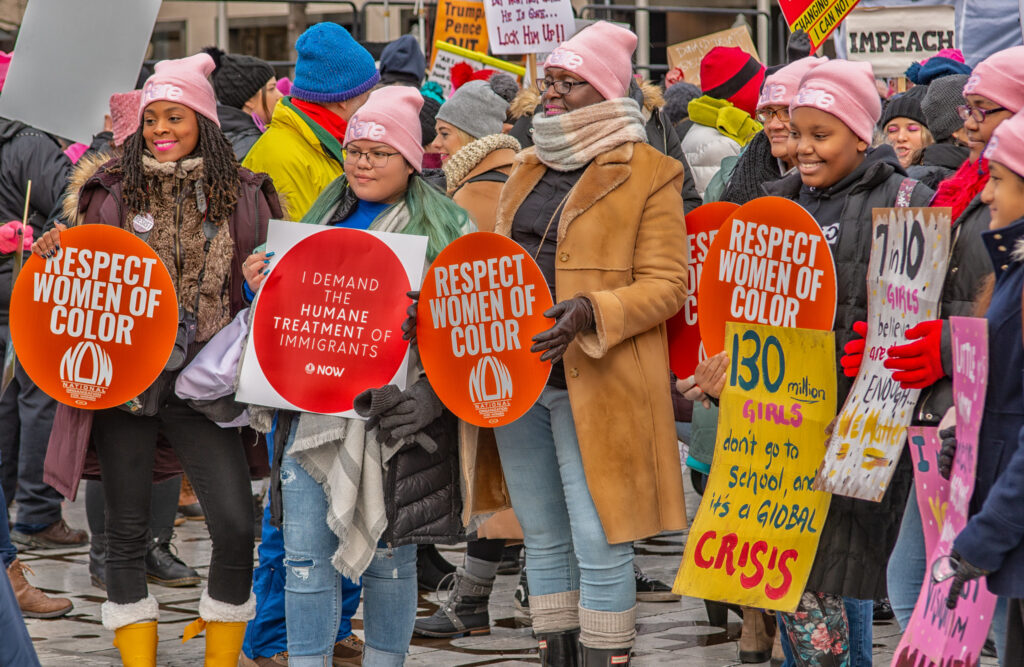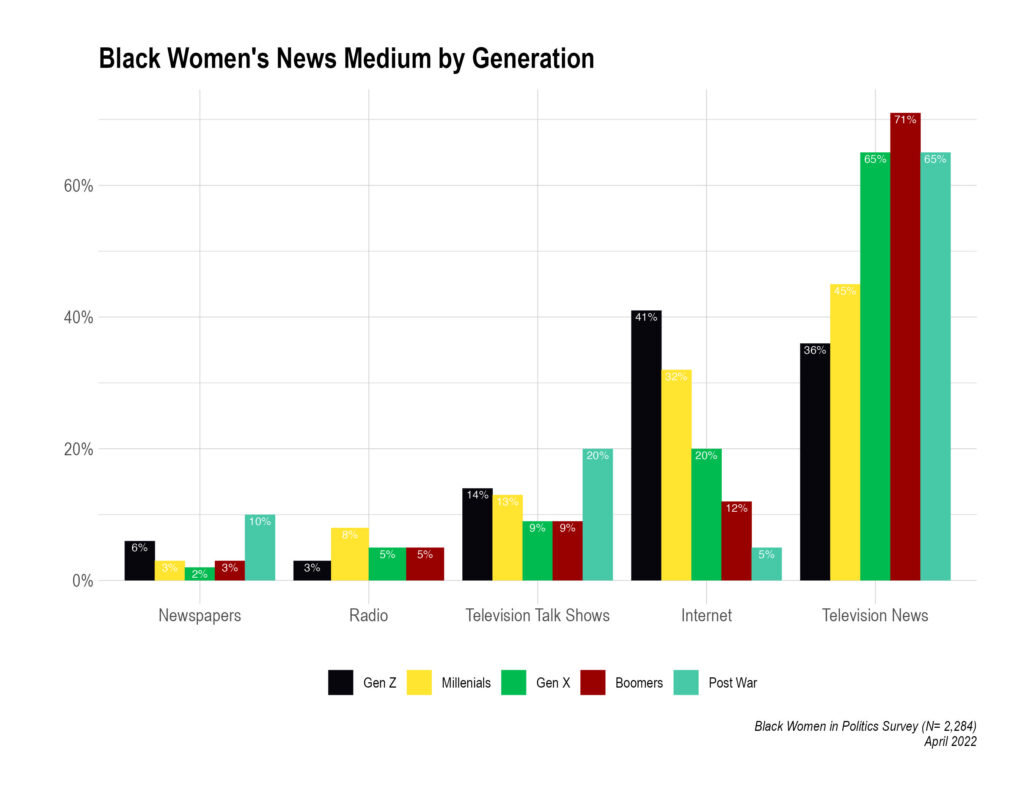
In 1892, Ida B. Wells began editing Free Speech, and used the Memphis newspaper to crusade against lynching. Her motto “Truth is mighty and will prevail” lives on in investigative journalism to this day. For the last two decades, many Black women have been lauded as the “saviors” of democracy – even as they eschew this label – because of their unwavering commitment to building open, responsive, and accountable institutions and because of their steadfast participation in the democratic process. Yet, as the paragons of democratic ideals, where do Black women get political information that educates and facilitates their involvement in the American political system?
We wanted to know how Black women engage with news today. We wanted to understand where Black women receive their news, how they form their opinions and policy priorities, and what they do with all that during elections. To find out, we recently completed a study that examines what media sources Black women frequent, how they engage with media and news, and how generation, education, and income shape their social media posting patterns.
Black Americans as a whole are more likely than other racial and ethnic groups in the U.S. to get their news on TV, according to Pew research. That’s also true of Black women, who, we find, watch television news more than any other source. The majority of Black women do not post their political views on social media. For the women who do post, it’s mostly on Facebook.
Here’s our takeaway: There are key variations in how Black women consume political news and how they engage with this information. Politicos must take these variations into account when reaching out to younger and older and higher- and lower-resource Black women.
Why study Black women’s media consumption?
Polls indicate that Black Americans tend to distrust news sources because many believe that news organizations do not accurately cover their communities. This distrust remains despite new journalistic remedies since the 2020 “racial reckoning” after George Floyd’s murder. And this distrust means many Black Americans turn to social media to get news and to discuss politics, giving them more control over the information they receive, creating a safer space for political conversations, and offering an effective way of advocating for Black rights and raising awareness of Black issues.
Yet many studies often do not disaggregate by gender, failing to explore the extent of variation among Black Americans. Intragroup differences among Black women reveal even more detail about how media is consumed. Our study suggests the distinctions among Black women of different generations and socioeconomic backgrounds should be taken into consideration when developing strategies to reach Black female voters. Learning more about these differences can help politicians and advocacy groups better tailor their messages to Black women. This knowledge can also help inform policies to better support Black women.
Political news: TV or internet?
Because political news is not objective or simply fact-based, social scientists routinely find that it matters whether individuals get their news from television, radio, newspapers, or the internet – and specifically, social media. In our study, we find that 54% of Black women go to television news as a primary source, 26% browse the internet as a primary source, and 11% watch television talk shows. The remainder consult either radio or newspapers.
Recently, the Pew Research Center studied Black Americans’ news consumption, finding similar patterns. Not all Black people use social media as a primary source; that finding runs counter to the discovery that most Americans overall now rely on social media for news stories. Black people are more likely to get their news from local and national television news than social media. Pew found that Black Americans are more likely than white Americans to get news from certain social media sites. But still, Black women turn to traditional news outlets for the information. Our work confirms that more research is needed to understand gender divides among Black public opinion.
How we conducted our research
Few studies examine Black women in insolation. We surveyed 2,284 Black women voters in March 2022, during the months leading up to the 2022 midterm election. We used a Qualtrics online survey panel, an opt-in survey community. Qualtrics uses its internal targeting to send targeted email invites to the requested sample, which in this study was a nationally representative sample of self-identified Black women. Our sample was evenly balanced on regional variables to ensure that we didn’t have an oversample of Black women from the south – where Black people are geographically concentrated.
Where do Black women receive their news?
The vast majority of Black women receive political news via television, although we find differences based on educational attainment and generation. Women with less than a high school diploma and who were born after 1981 are less likely to report TV as their primary source of political news. Baby Boomer (born between 1946 and 1964) and Gen X (1965 to 1980) Black women are more likely to get their political news from TV.
This indicates that more Black women may be increasingly turning to other sources, such as social media, to get their political news. This shift may be because Black women are more likely to be connected online and have access to a wider range of news sources. Additionally, this shift may also be because Black women are increasingly aware of the potential bias of the mainstream media.

Which Black women frequently post on social media?
Our data indicate that many Black women do not post political news on social media. Over 73% of Black women do not share their political views on social media sites such as Facebook, Twitter (now X), Instagram, or TikTok. The remaining 27% of Black women in our survey report they post on social media at various frequencies. So who posts, and where are they posting? Unsurprisingly, Black women born before 1965 (currently ages 60 to 78), are less likely to use the internet to discuss politics than their digital native sisters, Millennials (ages 24 to 45), and members of Gen Z (ages 18 to 23). Yet even with this digital divide, Black women still engage with and participate in political discussions online.
Social science research consistently demonstrates that Black women have high levels of political engagement when compared to their racial or gender counterparts. Yet there are big differences in SES among Black women, translating into varied forms of online political engagement. Five percent of Black women with the least financial means – those earning less than $10,000 a year – indicate that they post “all the time” on social media, whereas 80% of their sisters in the same financial category do not post at all. This is the most intra-group variance in our study.

On what platforms are Black women posting political messages?
Indeed, lower-resourced Black women are the most fascinating group in our study because of this variance. The group is full of contradictions. This group posts across various platforms – but mostly engages with sites like Instagram or TikTok, visual mediums in which users typically share pictures or videos. However, they also post on platforms that can be text-heavy such as Twitter (now X) and Facebook. Contrary to the resource model of political participation, which notes that citizens need time, money, and skills to engage in American politics, our data indicates that lower-income Black women are bridging the digital divide to engage with politics because this may require less time and because as digital natives they have the skillset to do so. In sum, Black women do not have to have high levels of resources to remain engaged in politics.
Black women who post political messages online are more likely than their counterparts who do not post online to be active in organizations that aid in developing their civic skills. Political scientists have shown a strong relationship between Black Americans’ political life and involvement in Protestant churches. Thus, our finding that Black women who post political messages are most active in church is unsurprising. However, our data demonstrate that Black women who are active in other kinds of organizations – ranging from the national Democratic party to exclusive Black women’s organizations such as the Links – are more engaged online than their counterparts who do not use social media to post political messages. Over 70% of Black women who do not participate in any organizations also don’t make political posts, an indication that organizational affiliation matters.
In sum, we find that Black women consume political media and engage with social media in ways that vary from one another. In a political climate where overall Black Americans distrust the media and are paying less attention to political news, Black women challenge conventional wisdom about who participates and how. The traditional resource model does not fully capture Black women’s political engagement.
Implications of our study
According to a February 2024 Axios poll, Americans in general are paying less attention to political news this far ahead of the 2024 presidential election. This poll found that many Americans are feeling exhausted by the constant barrage of media coverage and information. They are turning to other sources for news and feeling overwhelmed by the number of sources available. Additionally, Americans are also less likely to trust news outlets and are more likely to seek out news from sources they trust, such as friends and family. This shift in how people get their news and discuss politics will have a profound impact on the upcoming election.
African Americans report distrust in the media, but are more likely to rely on TV news for political news and information. They are also more likely to trust TV news than other forms of media such as newspapers or social media. However, when they use social media, Black Americans have little to no trust in information received from politicians or social media.
Having an informed citizenry is necessary for a functioning democracy. Yet American confidence in the media currently mirrors an all-time low set in 2016. Examining how and if voters have the political knowledge necessary to make informed decisions in a political climate where voters are polarized, get their information from disparate news sources, and report high levels of mistrust has implications for the upcoming elections.
Because Black voters will play a crucial role in the 2024 presidential election – among other national, state, and local elections – disaggregating combinations of race, gender, or income allows politicos to correctly target and mobilize a key voting bloc that is often discussed as a monolith. Like Wells before them, Black women engage with news media; those who have ties to sociopolitical organizations are actively discussing politics via various mediums.
So yes, Black women are a key demographic voting bloc for the upcoming election. Understanding how they get their news and where they discuss politics will enable a richer depiction of Black women’s political lives. Our data goes beyond the common left-of-center refrains of “Vote like Black women, listen to Black women, thank Black women, believe Black women.” We find that effective action will depend on exploring the many different ways that different Black women engage with politics.
This study was funded by the Idol Family Fellowship Program in the Anne Welsh McNulty Institute for Women’s Leadership at Villanova University.



